Diving headfirst into job search when you have little to none practical experience can be petrifying. But don't worry! Our guide is here to simplify the daunting task of writing your student resume.
Let us lead you through the process step by step with our practical tips, sleek resume templates, and detailed examples.
Keep reading to learn all about:
- Delving into valuable student resume examples
- Choosing the right format for your student resume
- Writing a resume summary that expresses your best skills
- Including relevant hard & soft skills in your student resume
- Describing extracurricular & volunteer experience in your work history
- Using powerful action words throughout your student resume
- Listing your academic credentials & awards properly
- Including valuable extra sections in your resume
- Avoding common mistakes in a student resume
- Pairing your resume with a relevant student cover letter
- Understanding the labor market trends for recent college graduates
- Accessing top resources for job-seeking students
Still looking for a job? These 100+ resources will tell you everything you need to get hired fast.
University student resume example
Why does this resume example work?
- Detailed work experience with recognition: The work experience section effectively describes the candidate's role and contributions as a Software Intern at Intel Corporation. The inclusion of specific tasks such as developing software applications, coding, and testing features provides a clear picture of the candidate’s hands-on experience. Additionally, receiving recognition as Employee of the Month highlights exceptional performance and dedication, making the candidate stand out.
- Strong academic background: The education section showcases the candidate’s academic excellence, particularly highlighting a GPA of 3.96 in Computer Science at the University of Waterloo. This strong academic record, combined with participation in relevant clubs and societies, demonstrates the candidate’s commitment and well-rounded skills in their field.
What could be improved?
- Lack of quantifiable data in achievements: While the resume provides a good overview of the candidate’s responsibilities and recognitions, it lacks specific quantifiable achievements that could strengthen the impact. For example, in the work experience section, instead of just stating "enhancing Intel's website functionality," the candidate could provide data such as "enhanced Intel's website functionality, resulting in a 15% increase in user engagement and a 10% reduction in load times."
Business student resume sample
Why does this resume example work?
- Leadership and initiative: The resume effectively highlights the candidate’s leadership skills and initiative, particularly in the education section where the candidate served as President of the Adam Smith Business Club. The mention of developing and implementing a new growth strategy that resulted in a significant increase in membership from 120 to 350 within one academic year showcases their capability to drive growth and manage teams effectively.
- Strong academic and extracurricular accomplishments: The applicant's perfect GPA of 4.0/4.0, coupled with the Best Graduate Award, reflects strong academic performance. Additionally, leadership roles in various student organizations, such as Vice President of the Debate Club and Social Media Manager for the Swimming Club, indicate a well-rounded profile with a balance of academic and extracurricular achievements.
What could be improved?
- Lack of specificity: The resume lacks specificity in some areas, particularly in the statement "Managed a team of seven individuals." While this indicates leadership, it does not provide enough context about what the team was responsible for or what specific achievements were accomplished under the applicant's leadership.
IT intern resume example
Why does this resume example work?
- Presence of interpersonal skills: The resume effectively highlights the candidate's soft skills, such as communication, team playing, and time management. These skills are crucial in collaborative environments and set the candidate apart as someone who can work well with others and manage their time efficiently. This is particularly important in IT roles where teamwork and communication are essential for project success and troubleshooting.
- Recognition and awards: The candidate’s achievements are well-documented, including being recognized as Intern of the Month at Saratech Corporation for exceptional performance. Additionally, the Best Graduate Award from high school and maintaining a high GPA at Princeton University with a placement in the top 10% of the program demonstrate the candidate’s dedication and excellence in their academic and professional pursuits.
What could be improved?
- General descriptions without context: While the resume lists various responsibilities, it often lacks context that would make the candidate's contributions clearer. For instance, "Contributed to the development of new web pages" could be enhanced by specifying the scope and impact of these contributions. A more detailed explanation such as, "Successfully developed and implemented three new web pages, which increased site traffic by 15% over the summer internship period," would provide a clearer picture of the candidate’s impact and the value they brought to their employer.
1. Choose the best format for your student resume
No matter if you're a high school, college, or higher education student, the first crucial step to writing your student resume is to choose the best format for your needs.
Generally, applicants who are current students will have limited formal work experience, but an extensive academic background. Along with coursework, this may include extracurriculars, student assistantships, internships, and volunteer work.
The best format for this type of experience is the functional resume. Functional resumes do not focus on work experience as a standard reverse-chronological resume would. Instead, this format focuses much more heavily on education, skills, and unpaid experience.
Of course, if you do have some work experience, you may want to opt for the more traditional reverse-chronological resume or a hybrid resume format. Reverse-chronological resumes focus on your most recent job first and work backward from there, making the work experience section the largest on the document. Hybrid resumes, by contrast, spread the focus out more evenly between all sections.
Choose your preferred template and make your resume shine.
2. Write a resume summary that expresses your best skills
Your resume summary is a short statement that summarizes your best attributes as a professional or as a student. This can include your credentials, accomplishments, or goals, but should always focus primarily on providing compelling details to catch the attention of the reader.
To help illustrate how to write a strong resume summary, here are two contrasting examples:
Bad student resume summary example
Current high school student who is looking for part-time employment in the automobile and mechanic industry. Has taken multiple shop classes working directly with automobiles and can provide a recommendation from the teacher. Strong and hard-working football player.
Why is this bad? Firstly, it lacks clarity and focus, jumping between unrelated points like shop classes and football. It doesn't highlight any specific skills or accomplishments that are directly relevant to the job in the automobile and mechanic industry. Additionally, mentioning "strong and hard-working football player" seems out of place and unprofessional, as it doesn't tie into the job target. Finally, it fails to convey enthusiasm or a clear objective, making it less compelling to potential employers.
Good student resume summary example
Hard-Working High School Student with a strong interest in beginning a career as a mechanic. 2+ years of experience working with automobiles in a supervised classroom setting, with a letter of recommendation from supervising teacher available upon request. Team-player with strong leadership and collaboration skills.
Why is this a good example? In this corrected example, the student includes a lot of the same information but with greater context and specific facts to back up their claims. The sentences have a better overall flow that gives the person reading the summary a clear oversight of who this student is and what their goals are.
Crafting a powerful resume summary is essential to making a great first impression. By focusing on relevant skills, providing specific examples, and maintaining clarity, you can create a summary that captures the attention of potential employers and effectively communicates your qualifications and aspirations.
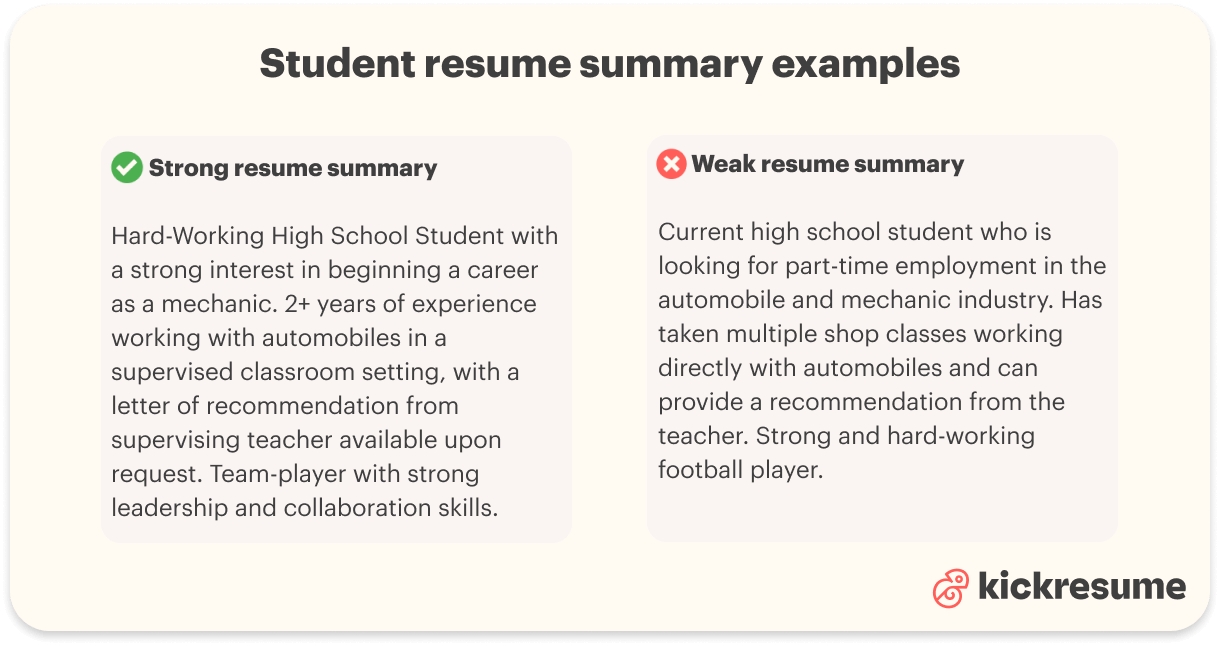
3. Include relevant hard & soft skills in your student resume
As a student, you have probably heard your teachers or professors say you need to hone your skills — but did you know there are two distinct types of skills you can have?
These two types of skills are known as hard skills and soft skills.
Hard skills refer to your technical and learned abilities, such as athletics or computer skills. These abilities take time and commitment to obtain, making them key qualifications for specific jobs.
Soft skills, comparatively, refer to your interpersonal and intellectual abilities that allow you to collaborate with others and understand the world around you. These can be both inherent and learned, and include things such as people skills and communication.
Including both types of skills on your resume shows the person reading it that you understand the importance of having both kinds. With this in mind, here are 10 ideas for both hard and soft skills that are great for a student’s resume:
The best student hard skills to put on your resume
- Athletic ability (strength, stamina, specific sports, etc.)
- Computer skills (typing, web browsing, researching, etc.)
- Computer software (Microsoft Office 365, Adobe Creative Cloud)
- Google workspace
- Budgeting
- Mathematics
- Fluency in foreign languages
- Creating presentations
- Public speaking
- Critical reading & note-taking
Effective soft skills for your student CV
- Leadership
- Teamwork & collaboration
- Written & verbal communication
- Calmness under pressure
- Determination
- Enthusiasm
- Problem-solving
- Creativity
- Professionalism
- Empathy
All in all, including a balanced mix of both hard and soft skills in your student resume is crucial for demonstrating a well-rounded skill set. This comprehensive approach can significantly increase your chances of standing out in a competitive job market.
4. Describe extracurricular & volunteer experience in your student work history
Crafting a work experience section for a student resume can be challenging, especially if you’ve never held a formal job. However, you can still create a compelling resume by highlighting part-time jobs, volunteering, and extracurricular activities.
Employers hiring students understand that your work history might not be extensive. What's crucial is demonstrating your skills, commitment, and experiences through various roles you’ve undertaken.
Bad example of a work experience entry from a student resume
Grayson County High School
High School Sports Team Captain
August 2020 - Present
- Worked with the team
- Did research for games
- Was Captain for a year
Why is it so bad? This example is vague and doesn’t provide specific details about your responsibilities or achievements.
Good example of a work experience entry from a student resume
Part-Time Jobs
Green Store, New York, NY
Cashier
June 2021 - August 2021
- Assisted an average of 50 customers per shift, ensuring a positive shopping experience.
- Managed cash transactions totaling $2,000 daily and maintained accurate sales records.
- Trained two new employees on customer service protocols and sales operations.
Volunteering Activities
Be Good Center
Community Center Volunteer
September 2020 - Present
- Organized community events for up to 100 attendees, including fundraising activities and workshops.
- Developed and led a weekly after-school program for local children, focusing on educational and recreational activities.
- Coordinated food donations, distributing meals to over 50 families each week.
Extracurricular Activities
Grayson County High School
Debate Team Captain
August 2020 - Present
- Organized a team of 30+ students to meet and practice debating weekly.
- Researched and fact-checked more than 100 debate drafts, providing corrections and feedback when needed.
- Re-elected for the captain position in May 2021 for the 2021-2022 school year.
Why does it hit the mark? This example provides detailed and specific descriptions of each role, highlighting relevant skills and accomplishments. By including part-time jobs, volunteering, and extracurricular activities, it shows a diverse range of experiences and capabilities. Each entry uses quantifiable data, such as the number of customers assisted or the percentage increase in sales, which demonstrates concrete achievements.
In essence, employers value all forms of experience, not just formal work history. By effectively highlighting part-time jobs, volunteering, and extracurricular activities in your work experience section, you can create a well-rounded resume that emphasizes your skills and experiences. Be specific and detailed in your descriptions to make a compelling case for why you’re the right candidate for the job.
5. Use powerful action words in a student resume
Using powerful action words in your student resume can make a substantial difference. These words help to vividly describe your accomplishments and responsibilities, making your resume more dynamic and engaging.
They convey:
- Clarity and precision: Action words provide clear and precise descriptions of your tasks and achievements, eliminating any ambiguity about your role and contributions.
- Impact: They create a strong and vivid picture of your experiences, making your resume stand out to hiring managers.
- Professionalism: Well-chosen action words demonstrate confidence and a proactive attitude, essential traits in any job seeker.
- Variety: Using varied action words keeps your resume from becoming monotonous and repetitive, maintaining the reader's interest.
Here are some valuable action words for your student resume to choose from:
Leadership and initiative
- Led
- Coordinated
- Initiated
- Directed
- Organized
- Managed
- Supervised
Achievements and results
- Achieved
- Earned
- Exceeded
- Improved
- Increased
- Optimized
- Reduced
Communication and collaboration
- Communicated
- Collaborated
- Presented
- Negotiated
- Mediated
- Persuaded
- Advised
Technical skills
- Analyzed
- Designed
- Developed
- Programmed
- Engineered
- Troubleshot
- Implemented
Problem-solving and creativity
- Solved
- Resolved
- Innovated
- Created
- Formulated
- Devised
- Enhanced
Volunteering and extracurricular activities
- Volunteered
- Participated
- Contributed
- Mentored
- Supported
- Facilitated
Including powerful action words in your student resume is crucial for creating a compelling and professional document. Not only do they clarify your roles and achievements but they also make your resume more dynamic and impactful. By carefully selecting and implementing these words, you can effectively convey your skills and experiences, making a strong impression on potential employers.

6. List your academic credentials & awards on your student resume
On a standard resume for established professionals, the education section should generally be kept short and sweet. However, student resumes often lack extensive work histories, leaving more room to expand on academic credentials and experience.
When listing an ongoing diploma or degree, it is important to note this to employers using an “Expected Date of Graduation” bullet point. Even though you have not graduated yet, this will give employers a better idea of when you will graduate and how your school schedule may affect the work schedule.
Additionally, it can be useful to include your GPA(s) when writing a resume while still a student, as this can help to illustrate your work ethic to employers.
You may also want to include relevant coursework and school activities, providing employers with a better understanding of the skills and knowledge you've acquired. Highlighting these elements demonstrates your commitment to your field of study and involvement in extracurricular activities, which can be just as valuable as work experience.
Here's an example of a well-crafted education section on a student resume
Wilkes Community College, West Jefferson, NC
Associate’s in Business Administration
- Expected Graduation: 2023
- Current GPA:8
- Relevant Coursework: Principles of Marketing, Financial Accounting, Business Ethics, Organizational Behavior
- President of the Business Club, Member of the Student Government Association
Ashe County High School, West Jefferson, NC
High School Diploma
- Graduated: 2020
- GPA: 0
Certifications
- First Aid & CPR, American Red Cross, 2024
- Lifeguard Certification, American Red Cross, 2024
Remember, expanding your education section to include relevant coursework, school activities, and academic awards can make your student resume more compelling. These elements provide a fuller picture of your academic background, skills, and extracurricular involvement, helping to compensate for a lack of extensive work experience.
7. Include valuable extra sections in your student resume
When crafting a student resume, including extra sections can be a valuable way to highlight your unique experiences, skills, and achievements beyond traditional academic qualifications.
These sections allow you to showcase your involvement in extracurricular activities, leadership roles, community service, and relevant projects. By including these extra sections, you can demonstrate your well-roundedness, transferable skills, and personal qualities that make you a standout candidate. Some examples of extra sections to consider for a student resume include:
- Leadership and Involvement: Highlight your participation in student organizations, clubs, or sports teams, emphasizing any leadership positions held and the impact you made.
- Volunteer and Community Service: Showcase your dedication to giving back through volunteering experiences, community projects, or service-learning initiatives.
- Projects and Research: Highlight any significant projects or research work you have undertaken, showcasing your problem-solving abilities, critical thinking, and hands-on skills.
- Awards and Recognitions: List any academic or non-academic awards, scholarships, or honors received, demonstrating your outstanding achievements and dedication to excellence.
- Professional Development and Certifications: Include relevant workshops, online courses, or certifications you have completed, emphasizing your commitment to continuous learning and professional growth.
Here's an example of how to effectively list your volunteer and community service
- Volunteer, Local Animal Shelter, 2019-Present
Assist in daily operations, including animal care, adoption events, and fundraising activities, promoting animal welfare and community engagement.
- Organizer, Annual Food Drive, XYZ High School, 2017-2020
Coordinated a team of volunteers, collected and sorted donations, and delivered food to local shelters, contributing to hunger relief efforts in the community.
8. Avoid common mistakes on a student resume
Creating a student resume can be challenging, but avoiding common mistakes can make a significant difference in how potential employers perceive your application. Here are some key pitfalls to avoid and tips on how to ensure your resume stands out:
- Being too vague: Using generic descriptions that don’t provide specific details about your experiences and accomplishments won't help your case. Use clear, detailed descriptions and quantify your achievements. Instead of saying “Worked on school projects,” try “Led a team of four classmates on a marketing project that increased social media engagement by 20%.”
- Typos and grammatical errors: Submitting a resume with spelling mistakes, grammatical errors, or incorrect information is a red flag for any hiring manager. Proofread your resume multiple times and consider using proofreading tools. Ask a friend, family member, or mentor to review your resume as well — fresh eyes can catch mistakes you might have missed.
- Overloading with irrelevant information: Don't include too much information that isn’t relevant to the job you’re applying for, such as unrelated hobbies or excessive personal details. Focus on experiences and skills that are directly relevant to the position. Tailor your resume for each job application by highlighting relevant coursework, activities, and experiences.
- Lack of clear structure: Creating a resume that is hard to read and navigate, with inconsistent formatting and structure is another big mistake. Use a clean, professional layout with consistent fonts, headings, and spacing. Organize sections logically, making it easy for employers to find key information quickly.
- Ignoring keywords: Failing to incorporate keywords from the job description makes it harder for your resume to pass through applicant tracking systems (ATS). Carefully read the job description and incorporate relevant keywords naturally into your resume. Match your skills and experiences to the qualifications listed in the job posting.
Avoiding common mistakes on your student resume is crucial for making a positive impression on potential employers. By being specific, proofreading carefully, focusing on relevant information, maintaining a clear structure, and using appropriate keywords, you can create a strong, professional resume. This approach increases your chances of landing the job and sets you on a path to career success.
9. Submit a relevant student cover letter with your resume
When applying for a job, internship, or any professional opportunity, it's often beneficial to include a cover letter along with your student resume. Understanding the difference between the two documents and ensuring they are cohesively designed can significantly boost your chances of making a strong impression.
A cover letter provides a personalized, narrative introduction to your application. It allows you to explain your interest in the position, highlight your most relevant skills and experiences, and convey enthusiasm for the role. It should be tailored to each specific job, focusing on how you meet the needs of the employer.
A resume, on the other hand, is a structured and concise summary of your academic background, work experience, skills, and accomplishments. It is a factual document designed to allow the hiring manager to quickly assess your qualifications and suitability for the role.
When to include a cover letter?
- Job applications: Always include a cover letter when applying for jobs unless the employer specifically states otherwise. It provides context that your resume alone may not fully convey.
- Internships: Like job applications, internships benefit greatly from a cover letter. It gives you the space to explain why you're interested in the field and how your academic experiences prepare you for the role.
- Scholarships and academic programs: When applying for scholarships or specialized academic programs, a cover letter can highlight your passion, dedication, and relevant achievements.
Having a matching design for your cover letter and resume creates a cohesive and professional appearance. Consistency in fonts, color schemes, and layout not only shows your attention to detail but also strengthens your personal brand.
Tips for consistent design:
- Fonts and colors: Use the same fonts and color schemes in both documents to create a harmonious look.
- Headers and footers: Align the headers and footers of your cover letter with those on your resume. This includes using the same style for your contact information and any additional elements like page numbers.
- Layouts: Ensure consistent spacing, margins, and overall layout to provide a uniform and polished appearance.
Remember, including a relevant cover letter with your student resume is essential for presenting a well-rounded application. This attention to detail not only conveys professionalism but also enhances your personal brand, making you stand out to potential employers.
10. Labor market outlook for fresh graduates
The labor market for fresh graduates remains strong, though uncertainties persist. According to the Bureau of Labor Statistics (BLS), the economy added 303,000 jobs in March, surpassing expectations and contributing to a low unemployment rate of 3.8%.
However, recent college graduates have faced challenges in securing jobs, indicating a mismatch between their qualifications and job market realities. As of October 2022, recent college graduates had an unemployment rate of 7.3%.
On a more positive note, there are still some sectors filled with job opportunities for new graduates. The industries experiencing significant employment gains include healthcare (+72,000), government (+72,000), construction (+39,000), and leisure and hospitality (+49,000).
As for the salary outlook, the National Association of Colleges and Employers (NACE) found that positive job outcomes for the class of 2022 had returned to pre-pandemic levels. Approximately one-fourth of graduates received a bonus, with men more likely to receive one (32%) compared to women (24%). However, there remains a gender disparity in bonus amounts, with women receiving about $3,200 less than men.
While the labor market presents a promising picture for fresh graduates, disparities in unemployment rates and salary bonuses highlight ongoing challenges. By focusing on industries with robust growth and being mindful of market realities, recent graduates can better navigate their entry into the workforce.
11. Top resources for job-seeking students
Crafting an effective student resume is your first step toward landing that coveted internship, part-time job, or entry-level position. However, knowing where to look for these opportunities is equally important. To complement your freshly polished resume, here’s a curated list of top job search resources specifically designed for students like you:
- Online job search engines: Websites with broad focus like Indeed, SimplyHired, Glassdoor, and ZipRecruiter are great entry points to your professional journey.
- Job boards for students: Platforms like Handshake, Aftercollege, College Recruiter, or Internmatch offer internships, part-time jobs, seasonal work, and entry-level career opportunities in a wide range of industries.
- University career services: You should also take advantage of your college or university's career services! These can help you with job placement, resume writing workshops, mock interviews, and attending career fairs.
- Networking events and career fairs: Attend career fairs and networking events hosted by your university or your local industry groups. These can be great opportunities to meet employers face-to-face and learn about job openings.
- Company websites: You can go straight to the source! If you already have a particular company in mind, search through their official website to find out if they offer internships or entry-level positions. Or reach out to them with your resume and cover letter and enquire about possible collaboration.
- Continuous learning: Learning doesn't stop the second your feet leave the academic soil! Online platforms like Coursera, edX, Khan Academy, or LinkedIn Learning offer a wide selection of courses that can expand your skills and increase your chances of getting hired.
Remember, the job search process can be competitive and tiring, especially for students with less work experience. It's more like a marathon than a sprint, really. So don't exhaust yourself at the very beginning. And don't forget to always update your resume with every new skill or experience you gain. Good luck!
Student Resume FAQ
What is the importance of a student resume?
Basically, your student resume is something like your ID in the workforce. It shows the recruiters who you are and what you can do. It's an opportunity to showcase your skills, academic achievements, and experiences. Having a resume is a must for anyone active on the job market. Without a resume, you won't be able to apply for job postings, because it's an essential part of any job application. Just as important, it's a chance to stand out amongst the competition and make that all-important first impression.
How can I tailor my resume to match the job description?
Understanding the job description is key. Go back to the job posting and read it thoroughly. Look for any key phrases and words relating to particular skills that are required from the candidate. Understand what the employer is looking for and make sure your skills and experiences align. Next, match keywords from the job description in your resume to show that you're a great potential fit. But, you should never lie on a resume!
What common mistakes should I avoid in crafting my resume?
One common mistake is submitting a generic resume. Each and every job application should have a specifically tailored resume and cover letter. Also, avoid mentioning irrelevant information and unnecessary filler words. Lastly, be wary of any spelling or grammar errors. Typos can easily ruin your first impression. But, an AI powered resume builder can take care of these minor errors for you.
Should my resume be one page or two pages long?
As a student, your resume should be one page long. With limited professional experience, one page should be enough to highlight your skills, education, volunteering, awards, and accomplishments.
Should I include references on my resume?
Undoubtedly, positive references from tutors or mentors can be an excellent guarantee of your skills when you don't have much real-life work experience to back them up. But ŕeferences don't usually belong on your resume. Instead, make a separate document with your references and be ready to produce it when asked to do so by the recruiters. You can also include a short note like “References available upon request” at the end of your cover letter.


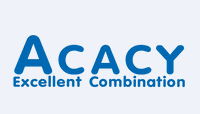
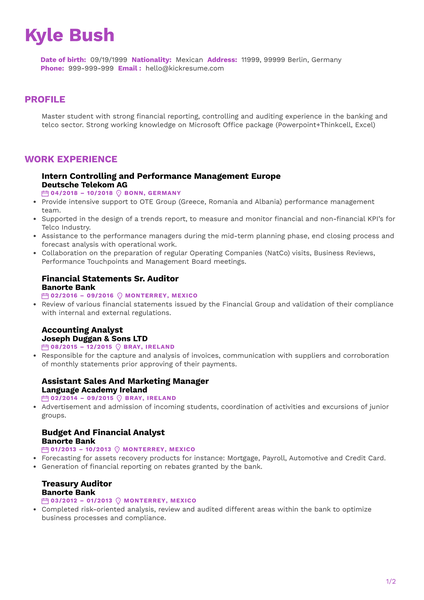

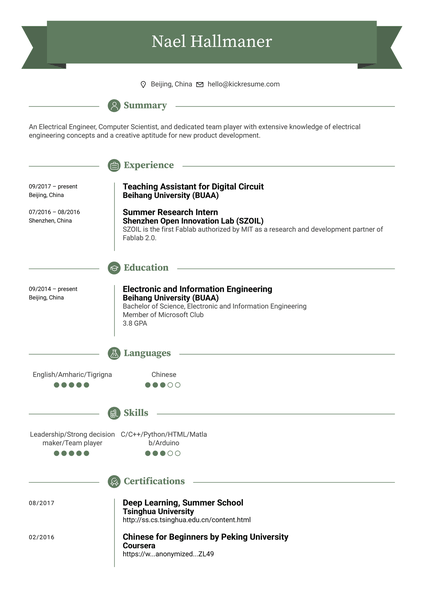




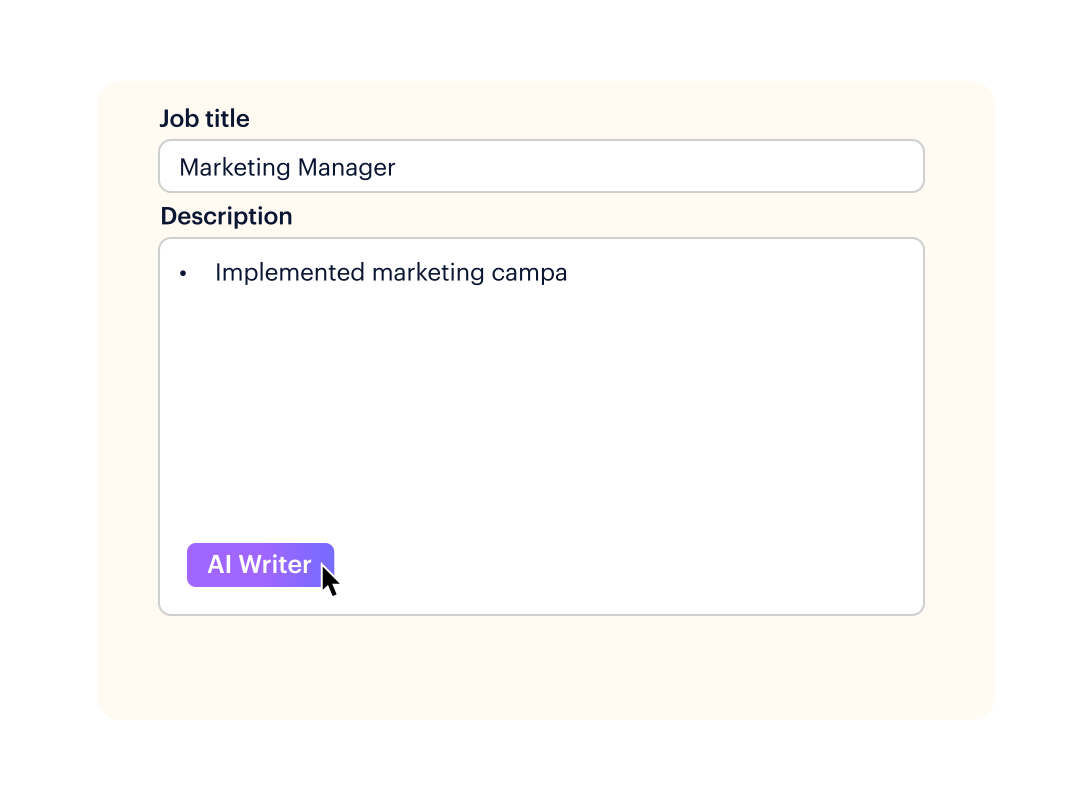

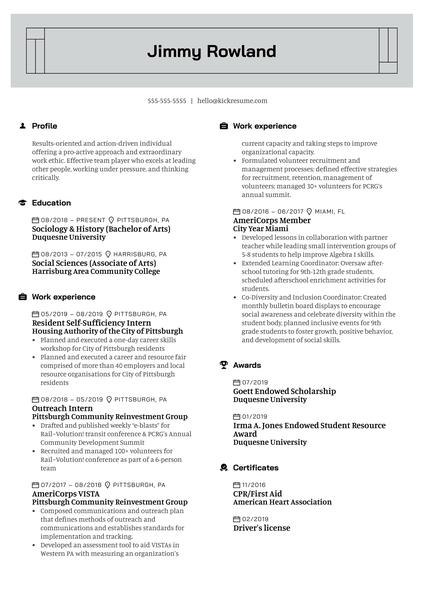
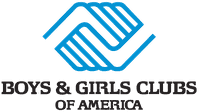
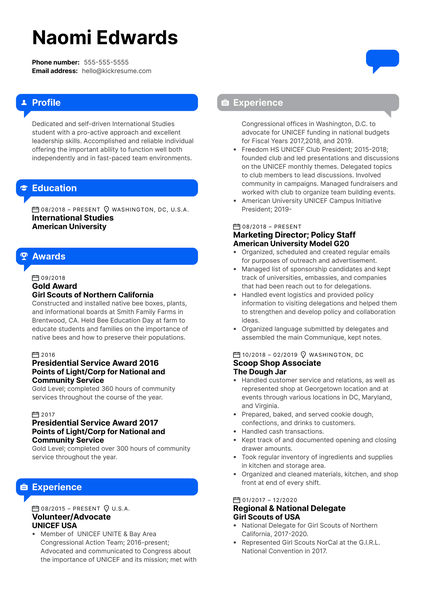
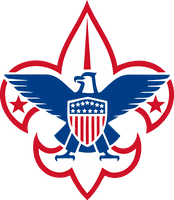
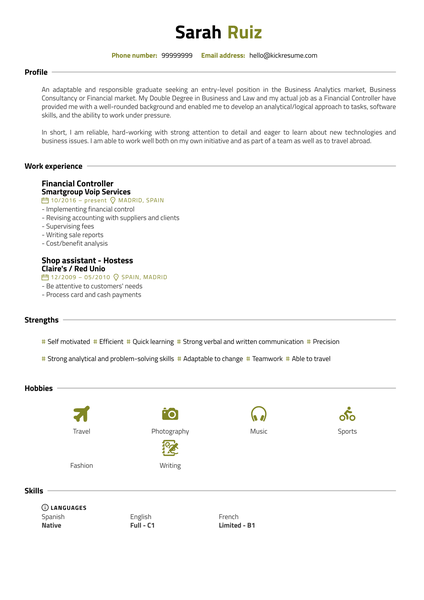
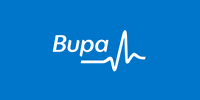

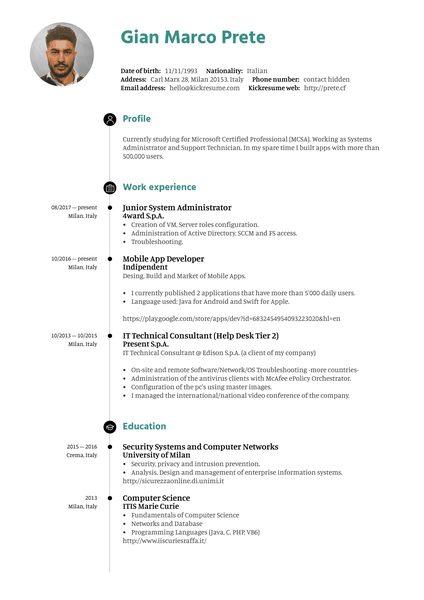
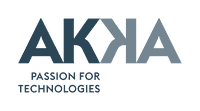
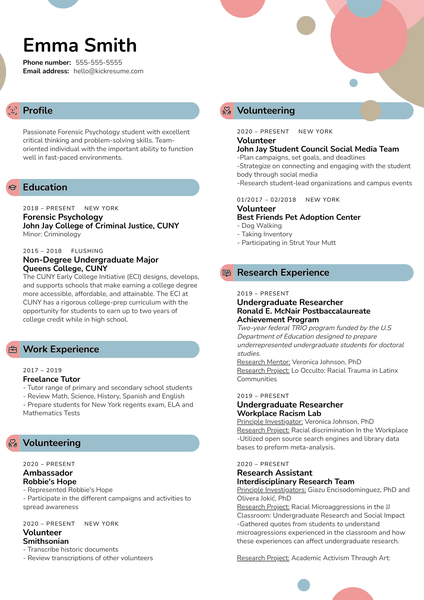

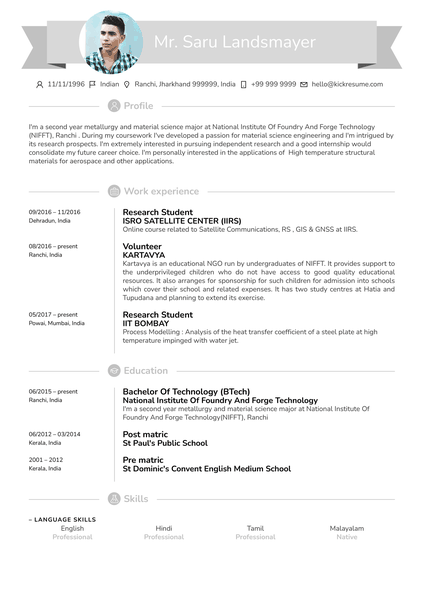
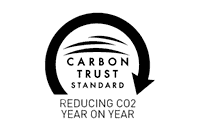
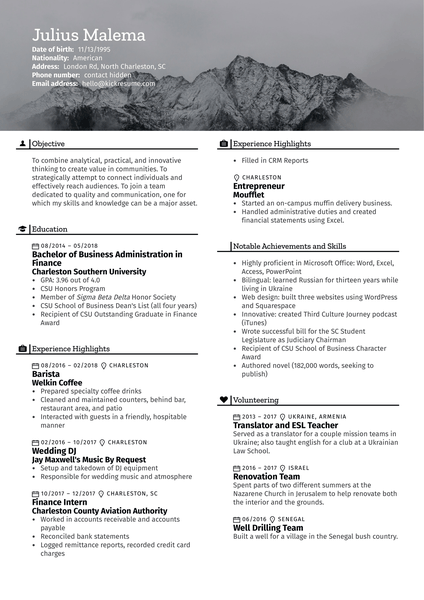
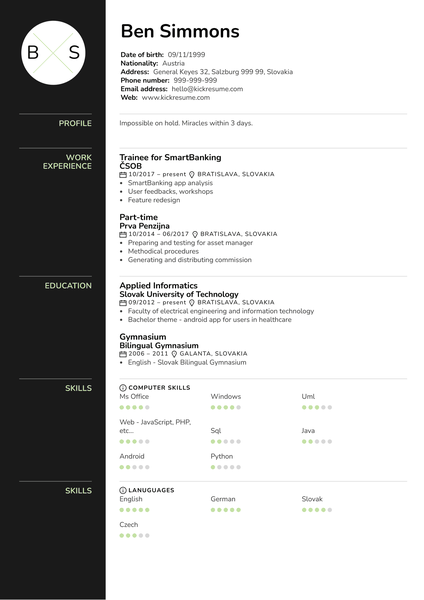
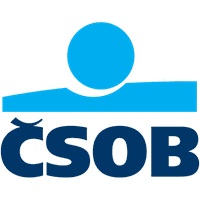
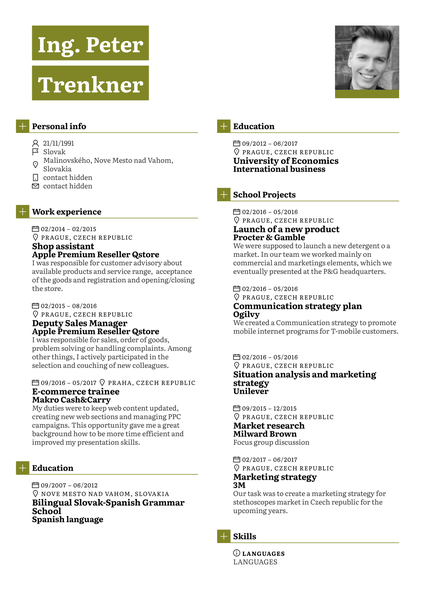

![Gerente de Línea Junior de Dell [ES]](png/thumbnail-637.png)
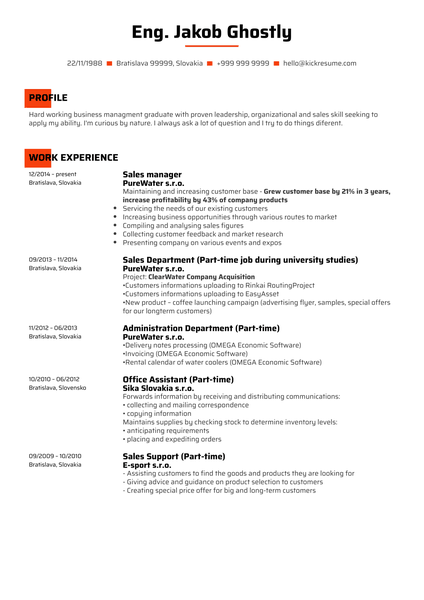
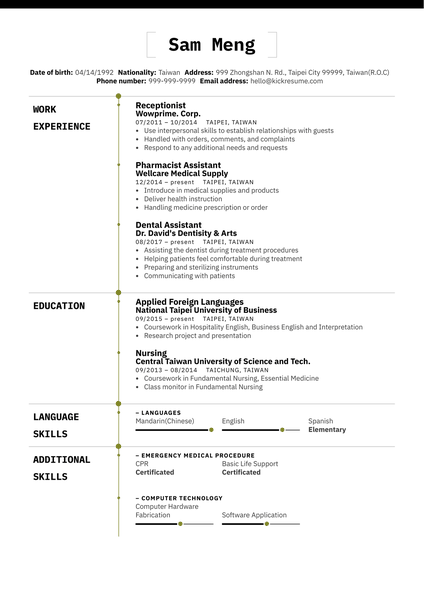
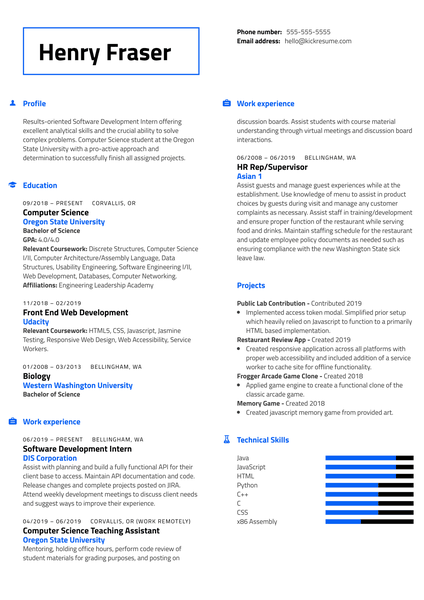

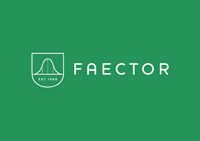
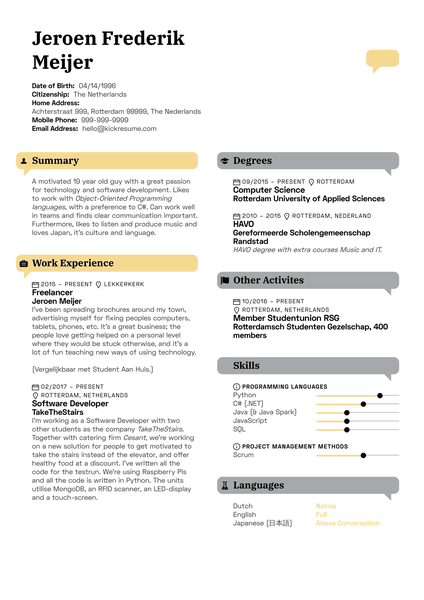

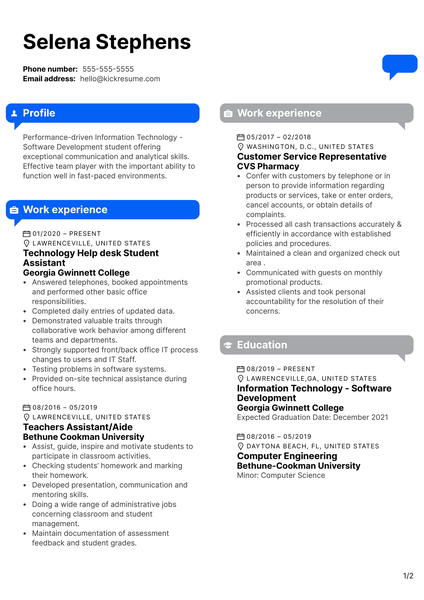
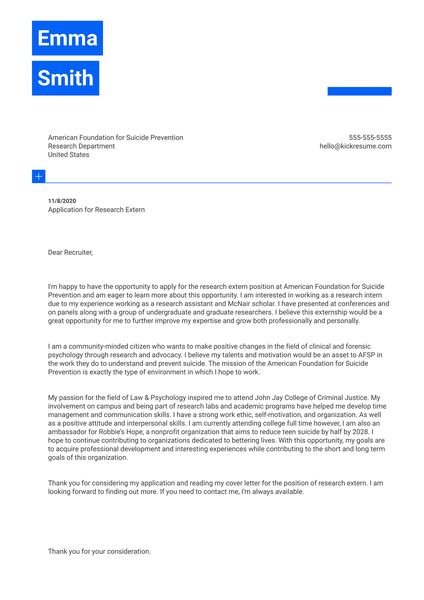

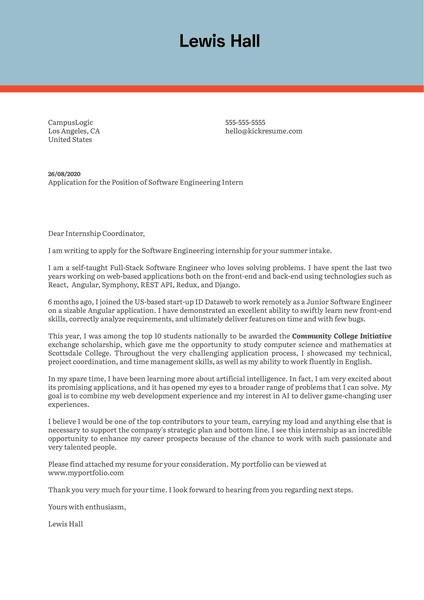
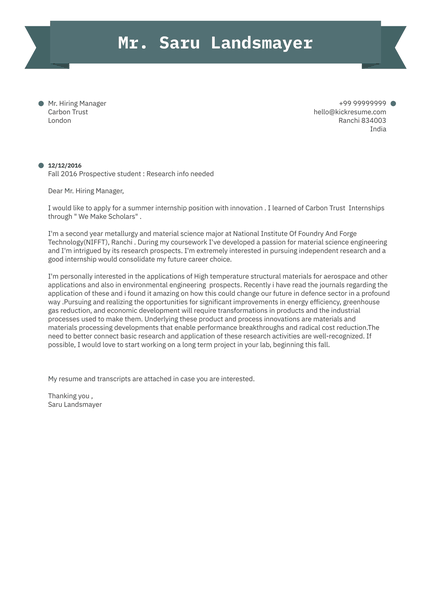
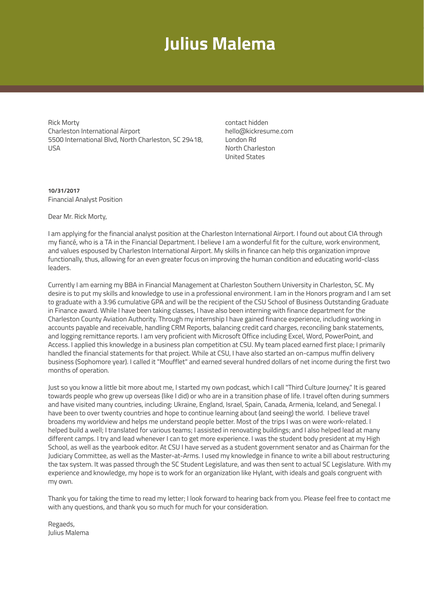
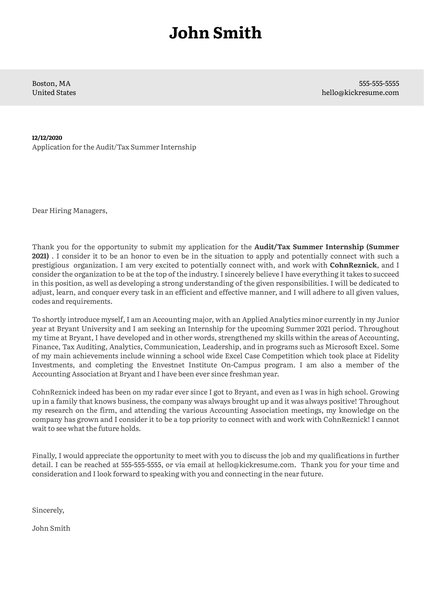
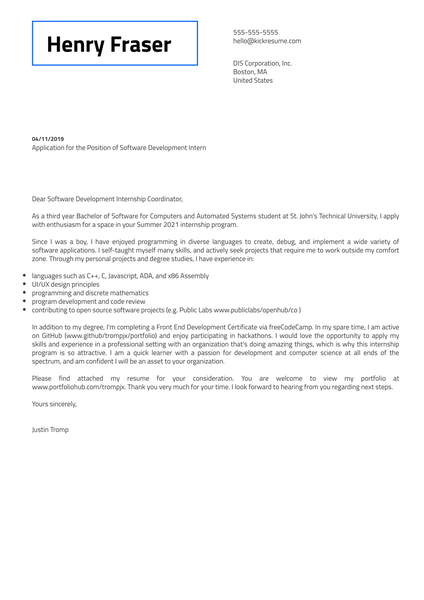
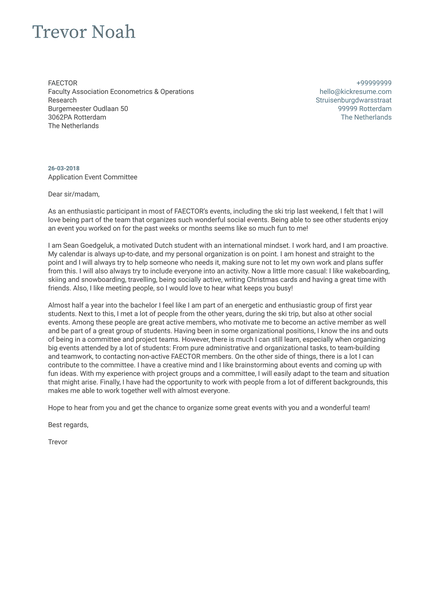
![How to Write a Professional Resume Summary? [+Examples]](https://d2xe0iugdha6pz.cloudfront.net/article-small-images/i-Profile.svg)
![How to Put Your Education on a Resume? [+Examples]](https://d2xe0iugdha6pz.cloudfront.net/article-small-images/i-Collage-Universities.svg)
![How to Describe Your Work Experience on a Resume? [+Examples]](https://d2xe0iugdha6pz.cloudfront.net/article-small-images/Experience.svg)


